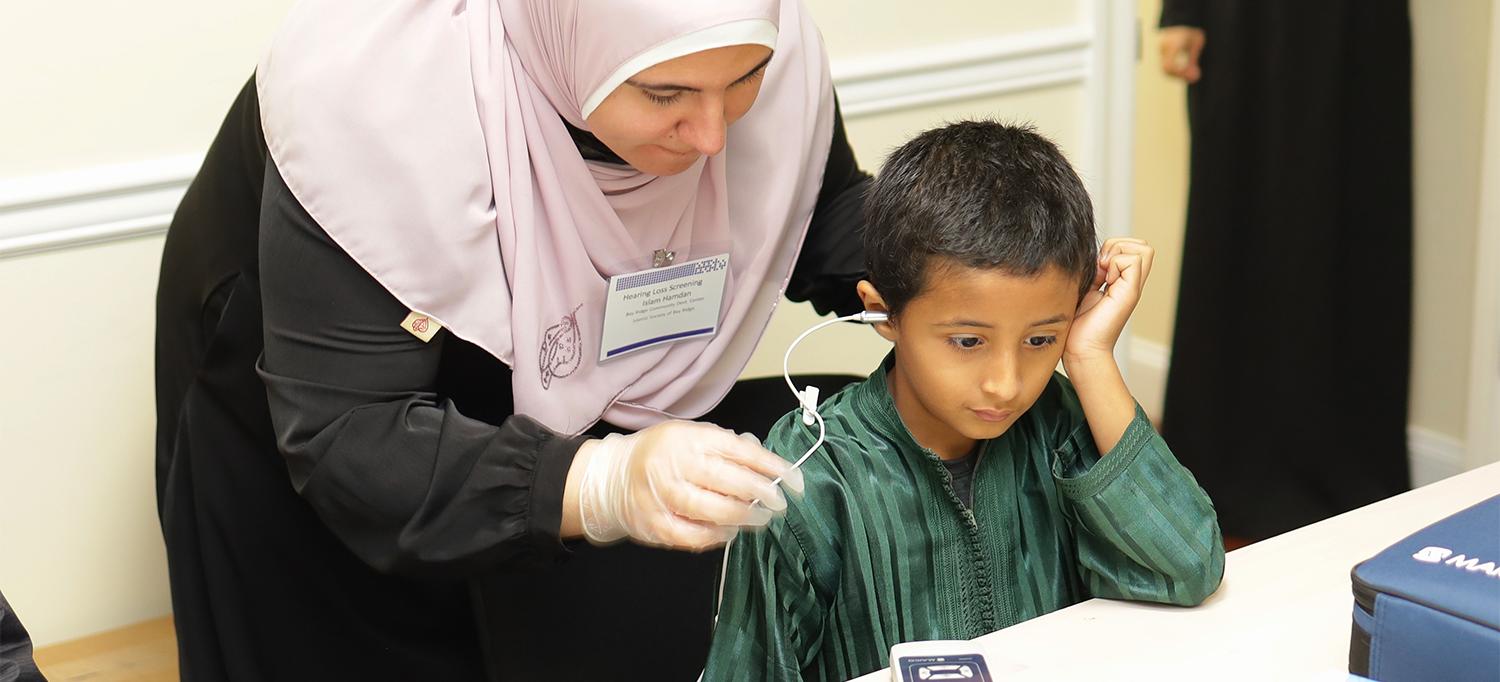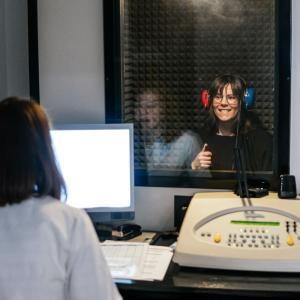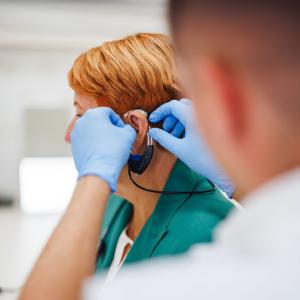NYU Langone Health & Its Institute for Excellence in Health Equity Have Created a Unique Hearing Loss & Awareness Screening Program for Low-Income Immigrant Families in Brooklyn & on Long Island

A volunteer screens a young patient for hearing loss during a hearing loss awareness program education event held at a community organization in Bay Ridge, Brooklyn.
Photo: Fred Verkhovsky
For two decades, J. Thomas Roland Jr., MD, professor of otolaryngology—head and neck surgery at NYU Grossman School of Medicine, has brought his expertise to distant nations. In the East African Republic of Uganda, where he launched a screening program in three major cities, he found that the incidence of hearing loss among children was as high as 13 percent. “I began thinking about what we could do in Brooklyn, where there are huge immigrant populations with kids who were never screened in their native countries and aren’t screened here until they start to fail in elementary school,” says Dr. Roland. “I thought, ‘Why don’t we start screening 1- to 5-year-olds in Sunset Park, the neighborhood where NYU Langone Hospital—Brooklyn is located.’”
Nearly half of Sunset Park’s residents were born outside the United States, and the neighborhood is home to nearly 35,000 youngsters. Worldwide, hearing loss is the fourth-largest disability. In this country, 5 out of every 1,000 children are affected, impacting their ability to learn a language, perform in school, socialize with peers, and in the long run, compete professionally. Even mild hearing loss can cause a child to miss as much as 50 percent of the information conveyed in a classroom.
Dr. Roland brought his idea to Gbenga Ogedegbe, MD, MPH, the Dr. Adolph and Margaret Berger Professor of Medicine and Population Health and director of the Institute for Excellence in Health Equity, whose team had developed a successful model for engaging local residents by educating the leaders of community- and faith-based organizations about healthcare priorities. In November 2022, the Hearing Loss Awareness and Screening Program for Low-Income Immigrant Families debuted, funded by a $1 million donation from Larry Silverstein, a trustee of NYU and NYU Langone Health.
Bottle feeding infants while they’re laying down can let milk into the Eustachian tube, which increases ear infection risk. “Feeding an infant upright is something parents can do to prevent certain types of hearing loss,” says otolaryngologist J. Thomas Roland Jr., MD.
Volunteers from community organizations are trained to perform screenings with a handheld device. A soft-tipped probe is inserted into the outer segment of each ear to check whether the hair cells in the inner ear, which relay sound to the brain, respond normally to auditory stimuli. The screenings are fast, painless, and free, including a car service to and from appointments, notes program director Moses Mansu, DrPH.
Based on the results of the screening, you may be referred to a clinician for a formal exam and audiogram, explains NYU Langone pediatric otolaryngologist Marie T. Homsi, MD.
Of the 148 screenings performed in Sunset Park so far, hearing loss was detected in 13 percent of children age 6 and younger and 50 percent in those age 7 and older. In June 2023, the screening program was expanded to Mineola, where NYU Langone Hospital—Long Island is located.
Dr. Roland plans to collect data that may help uncover the incidence and causes of hearing loss in immigrant children. “What we’re doing is quite unique,” he says. “This project has been so successful that other communities are now asking if we could screen their children, as well. Some parents ask, ‘Would you mind screening me, as well?’ and we’re happy to oblige. For now, we’re focusing on children, but our next project might be for people over age 65. Adult hearing loss is a big issue because it leads to depression, social withdrawal, and even dementia.”

